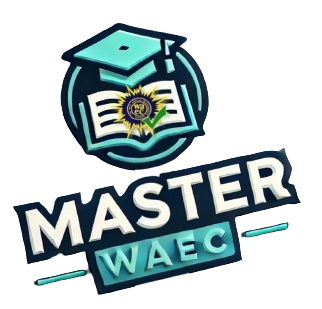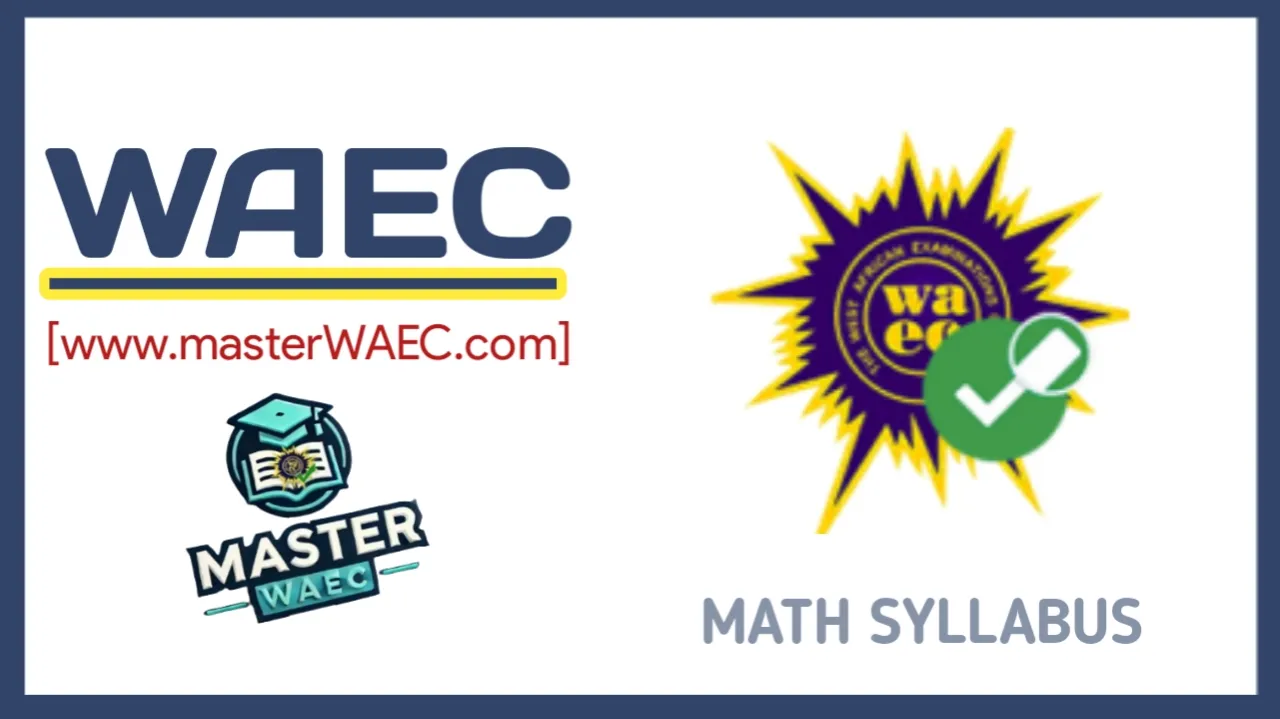The WAEC syllabus for mathematics is an essential material or guide for students preparing for the upcoming 2025 West African Senior School Certificate Examination (WASSCE).
As one of the most core subjects in WAEC, Mathematics requires thorough preparation, and the syllabus serves as a roadmap to ensure candidates focus on the key topics that matter most in the exam.
This syllabus is carefully designed by the West African Examinations Council (WAEC) to outline all the topics, objectives, and skills that candidates need to master.
From basic number operations to advanced calculus, the syllabus provides a structured approach to learning, helping students develop logical reasoning, problem solving skills, and confidence in tackling mathematical problems.
By following the syllabus, candidates can Identify the core topics and subtopics likely to appear in the exam, Allocate their study time efficiently to cover all areas, Avoid spending time on irrelevant topics not included in the examination scheme.
In this post, you will find the complete WAEC Mathematics syllabus 2025, along with detailed explanations of each section. To make your preparation more convenient, we have included a downloadable PDF version of the syllabus, so you can access it anytime, anywhere with out data connection.
Get ready to pass your 2025 WAEC Mathematics exam. Read on to explore the full syllabus and take the first step toward success and achieving good grades.

CLICK HERE TO PAY ₦2000 AND GET WAEC MATHEMATICS QUESTIONS & ANSWERS NOW
Aims of the WAEC Syllabus for Mathematics 2025
The WAEC Mathematics syllabus is designed with specific objectives to ensure candidates obtain the necessary skills and knowledge to suceed not just in the exam, but also in real life problem solving situations. Below are the aims of the syllabus:
1. Testing Mathematical Competence
The primary goal of the WAEC Mathematics syllabus is to assess students understanding and application of mathematical concepts. This includes their ability to:
- Perform accurate calculations.
- Apply mathematical knowledge to solve practical problems.
- Demonstrate a solid grasp of fundamental principles in various mathematical topics like Algebra, Geometry, and Statistics.
2. Developing Problem Solving Skills
Mathematics is about solving problems efficiently. The syllabus aims to:
- Equip students with the materials to analyze complex problems.
- Encourage the use of logical reasoning to find solutions.
- Prepare students to handle challenges in science, engineering, business, and daily life.
3. Fostering Logical and Precise Thinking
WAEC emphasizes the importance of clarity and precision in thought processes. By following the syllabus, candidates learn to:
- Develop structured approaches to solving problems.
- Communicate their reasoning effectively.
- Make accurate and logical deductions in mathematical and non mathematical contexts.
The WAEC Mathematics syllabus goes beyond preparing students for exams, it builds a foundation for lifelong learning and critical thinking. Mastering the objectives outlined in the syllabus ensures that candidates are not only ready for the WASSCE 2025 but are also equipped with skills that will benefit them in higher education and career paths.
Examination Scheme for WAEC Mathematics 2025
The WAEC Mathematics 2025 exam is structured into two papers to test students understanding of mathematical concepts and their ability to apply these concepts effectively. Below is a detailed breakdown of the examination scheme, including the number of questions, time allocations, and scoring details.
Paper 1: Objective
- Format: Multiple choice questions.
- Number of Questions: 50 questions covering the entire syllabus.
- Time Allocation: 1 hour 30 minutes.
- Scoring: This paper accounts for 40% of the total marks.
Questions in this section test students foundational knowledge and quick problem solving skills. Topics span all sections of the syllabus, including Number and Numeration, Algebra, Geometry, Trigonometry, and Statistics.
Paper 2: Essay
- Format: Structure and essay type questions.
- Number of Questions: 13 questions in total, divided into two sections:
- Section A: Candidates are required to answer 10 compulsory questions.
- Section B: Candidates choose 3 questions out of 5 optional questions.
- Time Allocation: 2 hours 30 minutes.
- Scoring: This paper contributes 60% of the total marks
Section A focuses on testing candidates ability to solve straightforward problems across various topics. While section B requires more detailed solutions and explanations, often involving higher level reasoning and application of mathematical principles.
Total Time: 4 hours (1 hour 30 minutes for Paper 1 + 2 hours 30 minutes for Paper 2).
Weighting: Paper 1 (Objective): 40%, and Paper 2 (Essay): 60%.
Detailed WAEC Syllabus for Mathematics 2025
The WAEC Mathematics syllabus is divided into key sections to ensure candidates cover all essential topics comprehensively. Below is an organized breakdown of the syllabus into categories for better understanding and effective study.
A. Number and Numeration
This section focuses on fundamental numerical concepts, forming the basis of many mathematical operations. Topics include:
- Number Bases: Conversion between bases, addition, subtraction, multiplication, and division in different bases (e.g., binary, octal).
- Modular Arithmetic: Remainders, modulo operations, and applications in real life scenarios.
- Fractions and Decimals: Simplification, comparison, addition, and subtraction of fractions.
- Indices and Surds: Laws of indices, simplification of surds, and applications.
- Logarithms: Basic logarithmic operations, including the use of logarithm tables.
B. Algebraic Processes
Algebraic concepts are essential for solving equations and understanding mathematical relationships. Topics include:
- Linear Equations: Solving equations in one or two variables.
- Quadratic Equations: Factorization, completing the square, and the quadratic formula.
- Algebraic Fractions: Simplification and operations with algebraic fractions.
- Simultaneous Equations: Solving linear simultaneous equations and quadratic-linear systems.
- Graphs: Plotting and interpreting linear and quadratic graphs, and understanding their real-life applications.
- Inequalities: Solving and graphing simple and compound inequalities.
C. Geometry and Mensuration
This section emphasizes spatial reasoning, measurement, and practical applications. Topics include:
- Angles: Types of angles, angle properties, and angle calculations in polygons.
- Triangles: Properties of different triangles, Pythagoras theorem, and trigonometric ratios.
- Polygons: Regular and irregular polygons, interior and exterior angle sums.
- Circles: Properties of circles, arcs, sectors, and chords.
- Perimeter and Area: Calculation of perimeters and areas of rectangles, triangles, circles, and other polygons.
- Volumes and Surface Areas: Calculation for 3D shapes, including cubes, cylinders, cones, and spheres.
D. Trigonometry
Trigonometry is a critical aspect of the WAEC Mathematics syllabus, dealing with the relationships between angles and sides of triangles. Key topics include:
- Trigonometric Ratios: Understanding sine, cosine, and tangent.
- Angles of Elevation and Depression: Solving real world problems involving angles and distances.
- Bearings: Using bearings to calculate directions and solve navigation problems.
- Trigonometric Identities: Basic trigonometric equations and their applications.
- Use of Tables and Calculators: Solving trigonometric problems with tools.
E. Statistics and Probability
This section introduces data analysis and probability concepts, preparing candidates to interpret information and predict outcomes. Topics include:
- Frequency Distribution: Organizing and analyzing data in tables and charts.
- Measures of Central Tendency: Calculating mean, median, and mode.
- Measures of Dispersion: Understanding range, variance, and standard deviation.
- Cumulative Frequency Curves: Drawing and interpreting ogives for data analysis.
- Probability: Experimental probability based on actual experiments or observations, Calculating probabilities using formulas and logic.
F. Calculus and Vectors
These advanced topics test candidates understanding of mathematical changes and vector operations. Key areas include:
- Differentiation: Basic rules, including derivatives of functions and their applications in rate of change problems.
- Integration: Basics of finding integrals, including definite and indefinite integrals.
- Vector Operations: Representation of vectors in two and three dimensions. Addition, subtraction, and scalar multiplication of vectors.
- Transformations: Applying geometric transformations, including translations, rotations, and reflections, to solve problems.
G. Introductory Calculus
Introductory Calculus focuses on foundational concepts that prepare students for advanced mathematical applications. Topics include:
- Differentiation of Algebraic Functions: Understanding the basic rules of differentiation And Applications in solving rate of change problems and determining slopes of curves.
- Integration of Simple Algebraic Functions: Basics of indefinite and definite integrals and Solving problems involving areas under curves.
H. Statistics and Probability
(A) Statistics
This sub section introduces candidates to organizing and analyzing data effectively. Topics include:
- Frequency Distribution: Understanding frequency tables and grouping data.
- Pie Charts, Bar Charts, Histograms, and Frequency Polygons, drawing and interpreting various data visualization tools.
- Measures of Central Tendency: Calculating mean, median, and mode for both discrete and grouped data.
- Cumulative Frequency Curve (Ogive): Plotting ogives and interpreting them for data analysis.
- Measures of Dispersion: Calculating range, semi interquartile range, interquartile range, variance, mean deviation, and standard deviation.
(B) Probability
This sub section focuses on the principles of chance and likelihood. Topics include:
- Experimental and Theoretical Probability: Understanding probabilities derived from actual data and theoretical models.
- Addition of Probabilities: Calculations for mutually exclusive and independent events.
- Multiplication of Probabilities: Finding probabilities for independent events using multiplication rules.
Important Advise for Candidates
To achieve a good grade in the WAEC Mathematics 2025 exam, candidates must adhere to specific rules and prepare adequately. Here are some key notes to keep in mind:
1. Use of Mathematical Tables and Calculators
- Candidates are allowed to use mathematical tables provided by WAEC. Ensure you know how to interpret and apply them for logarithms, trigonometric values, and other calculations.
- Only non programmable scientific calculators are permitted in the exam hall. Familiarize yourself with your calculator to avoid errors during calculations.
2. Materials Required for the Examination
To avoid any inconveniences, ensure you bring the following items to the examination hall:
- A clean mathematical set, which includes a compass, protractor, ruler, and set squares.
- Your approved WAEC registration slip as proof of identification.
- Pencils, biro, and erasers for rough work and final answers.
- A non programmable calculator for computations.
3. Restrictions
- Programmable Calculators: Devices with advanced programming functions are strictly prohibited.
- Mobile Phones and Electronic Devices: Phones, smartwatches, and other unauthorized gadgets are not allowed in the examination hall.
- Rough Work Papers: Only rough work done in the provided answer booklet is permitted; external sheets will be confiscated.
Candidates who fail to adhere to these rules can be penalized, so ensure compliance with all WAEC examination guidelines.
YOU MAY LIKE: WAEC Syllabus for Physics 2025: Proven Rodmap to A1
How to Pass WAEC Mathematics 2025
Preparation is key to pass WAEC Mathematics 2025 exam. Here are actionable tips to help you prepare effectively:
1. Create a Study Timetable Based on the Syllabus
- Break down the syllabus into daily or weekly goals.
- Allocate more time to complex topics like Calculus, Trigonometry, and Probability.
- Include regular revisions in your schedule to reinforce your understanding.
2. Practice Past Questions
- Solving past WAEC questions will familiarize you with the exam pattern, question types, and time management.
- Focus on both objective (Paper 1) and essay questions (Paper 2).
- Note recurring topics and prioritize them in your preparation.
3. Focus on Weak Areas
- Identify topics where you struggle and dedicate more time to mastering them.
- Use textbooks, online math tutorials, or seek help from teachers and peers.
- Consistently practice until you gain confidence in these areas.
4. Maintain Consistency in Strong Areas
- Dont neglect the topics you are already good at.
- Regularly revise these areas to ensure you don’t forget key concepts or formulas.
5. Simulate Exam Conditions
- Set aside time to solve practice questions under timed conditions.
- Mimic the actual exam setting to improve your speed and accuracy.
WAEC Syllabus for Mathematics 2025 PDF Download
To make your preparation easier, we have provided a downloadable PDF of the WAEC syllabus for mathematics 2025. This document contains all the topics, examination schemes, and objectives in one place, ensuring you have everything you need at your fingertips.
Click the link below to download the complete WAEC syllabus for mathematics 2025.
DOWNLOAD PDF
Conclusion
WAEC syllabus for mathematics 2025 is a must have material for any student preparing for the upcoming WAEC exam. By studying the syllabus thoroughly, you will have a clear understanding of the topics to focus on, the examination structure, and the skills required to pass the paper.
MasterWAEC.com strongly encourage you to download the PDF provided in this post and start your preparation immediately. A1, B2 or C4 grade in WAEC Mathematics is achievable with consistent effort, effective study techniques, and the right resources.
If you have any questions or need additional support, feel free to leave a comment below. We are here to guide you every step of the way. Good luck with your studies!

Kolade Kayode, known as Mr. KK, I am a Nigerian education blogger and founder of MasterWAEC.com. Passionate about student success, I simplifies WAEC exam preparation with accurate tips and resources to help students excel.


5 thoughts on “WAEC Syllabus For Mathematics 2025”